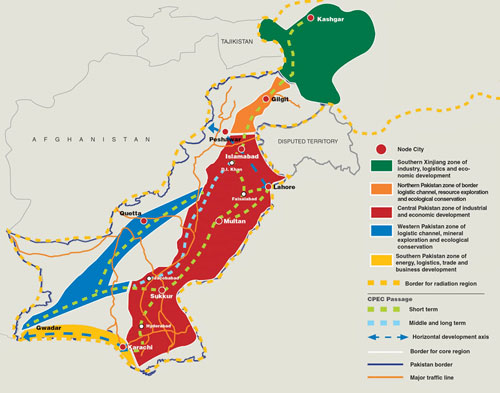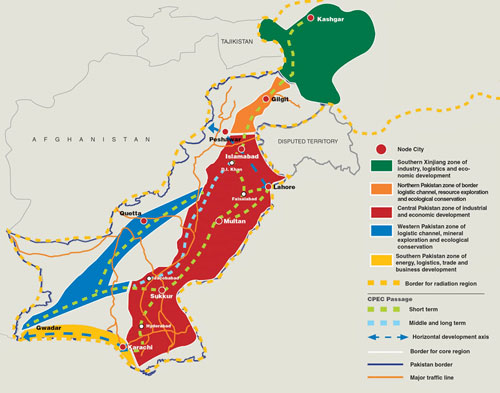PAKISTANFOREVER
ELITE MEMBER

- Joined
- Aug 15, 2015
- Messages
- 17,371
- Reaction score
- -6
- Country
- Location

CPEC: Wider Regional Integration - Pakistan Observer
THE most significant and decisive factor in the interstate relationship of the states is the bilateral trust and mutual respect of each other’s sovereignty.
CPEC: Wider Regional Integration
By
News desk
-
February 24, 2021
0

Brig (R) Muhammad Khan
THE most significant and decisive factor in the interstate relationship of the states is the bilateral trust and mutual respect of each other’s sovereignty.
In international relations these aspects are driven by national interests of the states. In the relationship of Pakistan and China bilateral trust and mutual respect of each other’s sovereignty have been the defining factors.
Generally, there has been convergence of national interests of both states in many areas. The China-Pakistan Economic Corridor (CPEC) is the latest manifestation of trust, mutual respect and shared national interests with common developmental goals of both countries.
CPEC is aimed to drive practical cooperation between the two countries for the development of port facilities at Gwadar and other projects like energy resources, infrastructure development and industrial cooperation.
The ultimate objective of these projects is economic opportunities for the masses of the two countries and other regions of Asian Continent.
Siegfried O. Wolf authored a book entitled, “The China-Pakistan Economic Corridor of the Belt and Road Initiative: Concept, Context and Assessment”. The essence of this book is that CPEC is a project of immense significance for Pakistan and China.
The book provides an in-depth analysis of Belt and Road Initiative (BRI); the gigantic Chinese project, which encompasses a set of corridors and Maritime Silk route spreading over three continents: Asia, Africa and Europe.
The author highlighted the philosophy behind Belt and Road Initiative (BRI) and more about the strategy of Economic Corridors (ECs).The primary objectives of having these economic corridors are to connect China with its neighbours and then other regions and countries beyond Asia.
Contextualizing from history, the ancient Silk Road started during the westward expansion of Chinese Han Dynasty from; 206 BCE to 220 CE.
It forged trade networks passing through the contemporary Central Asian Region, Afghanistan, India and today’s Pakistan to further south, reaching over to European and African continents.
The BRI is therefore, revival of the old Silk Road and Maritime Route by modern Chinese leadership. The enormous size of Chinese economy and heavy industrialization warrants new communication corridors and routes in this highly interconnected and globalized world.
Besides, China needs energy resources and raw material in order to maintain its sustained growth and economic development.
The huge industrial base of China lacked the needed energy resources on a long-term basis.
China is currently importing over 50% of its energy resources from Middle East region and African countries.
Besides, it imports over 30 oil and gas from Central Asian region and Russia. Chinese imports and energy resources from the Middle East and Africa have to pass through Indian Ocean region, before entering the South China Sea.
Since Indian Navy is dominating the Indian Ocean Region (IOR), therefore in a future scenario there may be constraints for Chinese trade at the Strait of Malacca; a key point in the Indian Ocean.
Strait of Malacca is a narrow passage of water between the Indonesian island of Sumatra and the Malay Peninsula. In 2003, Chinese Government highlighted its vulnerability at Malacca; ‘Chinese Malacca Dilemma’.
There have been many studies under Chinese Government and at the level of its think-tanks and universities to find out alternative routes for Chinese trade and energy imports.
Well deliberated findings of all such studies concluded that, in case there is a blockade of Malacca Strait, there are a few alternative routes available to China for its trade and oil imports.
Other available alternatives are either incompatible to take on the weight of modern ships and heavy traffic or else causing heavy expenditures owing to longer routes.
CPEC is the only secure and guaranteed alternative which can guarantee an uninterrupted flow of Chinese trade and energy resources.
It is shortest route, less expensive and more secure for the sustenance of Chinese energy and trade needs. Chinese leadership had selected CPEC after years of deliberations while weighing its pros and cons.
President Xi Jinping is the architect of this project, who has been embarked upon the position of life-time President and Secretary General of Communist Party of China (CPC).
From the Chinese perspective CPEC is the most significant part of BRI. Its (CPEC) timely completion will provide a boost for the completion of other projects and corridors of the BRI.
The Chinese dream for global governance through its soft approach depends a lot on the implementation of BRI and completion of CPEC will be a booster for the BRI. In a rapidly evolving regional and global security situation, Pakistan holds the key for the continuance of Chinese economic development by providing a secure energy corridor.
Sequel to the development and operationalization of Gwadar Port, completion of CPEC as per scheduled is the real challenge, facing China and Pakistan.
Despite its financial constraints, Pakistan has dedicated two security divisions under Pakistan Army for ensuring security of the CPEC from Khunjerab Pass to Gwadar.
In 21st century, economy (trade and commerce) drives the world politics. The strategic competition and the trade war between Washington and Beijing should not hamper the CPEC, since it is a project of economic benefits for all regional states including India, Iran, Central Asian and GCC states.
Whereas, CPEC effectively addresses the Chinese Malacca Dilemma, it provides a golden opportunity for the wider integration between various regions and states of Asian Continent. Now, it is up to the leadership of the Asian states to secure the future of their posterity through a visionary approach and prudence.



